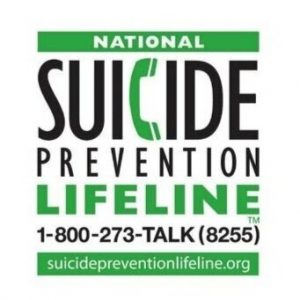We all wonder from time to time if we or a loved one is depressed, and why we are so. Let me try to shed some light on these questions.
Clinically there are several types of depression, but there are two types therapists usually work with; Major Depressive Disorder (MDD), and Persistent Depressive Disorder (PDD), also called Dysthymia. (PDD is basically a less intense but much longer lasting version of MDD.) Here I will focus on MDD, but a lot of what I say can be applied to PDD.

Some therapists use tools such as the well-regarded Beck Depression Inventory to help diagnose Depression, but the cornerstone of diagnosis is the DSM-5, so let’s look at the official diagnostic criteria for adults. If you think you see yourself in there, or even if you think you might, by all means see a mental health professional!
**And if you are even thinking about suicide please don’t do it.
Please call 911 or the national suicide prevention lifeline immediately. They even have chat!**

For MDD it’s a two-part diagnosis. First, you must have either a depressed mood, or loss of interest or pleasure from nearly all activities, or both, for at least 2 weeks.
Depressed mood refers to feeling sad, empty, or hopeless most of the day, nearly every day, from your own point of view or as observed by others. The loss of interest and pleasure, dysphoria, is to me to be the core depression; people generally seem to feel more pained by it than by experiencing a down mood.
The second part of the official criteria for MDD is that you have to have at least 4 of the following 7 symptoms.
-
Gaining or losing a lot of weight, like more than 5% of your body weight in a month without dieting, or having a decrease or increase in appetite nearly every day;
-
Insomnia or hypersomnia nearly every day;
-
Others see you as being restless or slowed down, every day, not just from your own POV;
-
Fatigue or loss of energy nearly every day;
-
Feeling worthless or inappropriately guilty nearly every day – not just feeling guilty or being upset with yourself, or feeling guilty, but much stronger feelings, even up to delusions about your worthlessness;
-
Being less able to think or concentrate, or being indecisive, nearly every day – either in your own POV or as observed by others;
-
Recurrent thoughts of death (not just fear of dying), recurrently imagining suicide without a plan, or developing a plan for suicide, or attempting suicide
Beyond that, like with pretty much any diagnosis, the symptoms a person is experiencing have to be causing significant distress or impairment in social, occupational, or other important areas of functioning, and the episode can’t be better attributed to substance use or another medical condition.
If you think you see yourself in there, or even if you think you might, by all means see a mental health professional!
Now let’s try to understand it better. Depression stems from your beliefs about yourself, your goals, and your appraisal of what a situation ultimately means. More specifically, I tell my patients that at its core, depression is anger turned inward. Let me explain by using eminent psychologist Richard Lazarus’ theory of emotions as appraisals, which is at the core of how I do therapy.
A person finds themselves in a situation with painful, even dour or dire consequences. Job loss, a relationship ending, a major health problem – all of these losses and many others make us feel sad. There’s nothing abnormal about feeling sad due to them, and many people experience them without going into Depression.
But what makes one person’s lament another person’s depression? What we think and feel about what the loss means – about us and for us.
A healthy sadness allows us to process that a loss is permanent. In healthy sadness, the ideas, people, and relationships we are committed to are lost to us but there is no one to blame. The healthily sad person correctly appraises that the loss cannot be stopped or reversed; they are helpless to do anything about it and become resigned to it. The loss causes a temporary loss of engagement with things and people, but eventually the distress disappears because the person fully gave up their lost commitment and has hope for replacements.
Depression is a much more negative appraisal. Rather than being honestly and correctly helpless about a blameless loss, sometimes a person becomes hopeless due to their loss. They become hopeless about being able to withstand the lost connection and about their ability to gain new ones – ultimately because they believe there was something fundamental about them that caused the catastrophic loss or failure. They then turn to punish themselves. This is anger turned inward.
In depression, you don’t just get sad from losing your job, status, or partner, you appraise that it was some deep flaw(s) of yours that led them away, and that since those flaws are fundamental to you, you’ve made it so that your future is damned. In the words of one of my psychological heroes, Alfred Adler (the creator of Adlerian psychology), you “act, think, and feel in such a way as if the horrible fate you have conjured up had already befallen you and was inevitable.”
It’s painful to give up on our commitments, especially the ones we come to feel define us. But it’s a little easier to choose to see that even a great loss doesn’t have to be one that destroys the meaning in your life. I bet you can see that among the people you know who have experienced major losses, those who have more commitments in their lives outside the one they lost get sad, but are less likely to become depressed.
In sum, depression means deciding, consciously or unconsciously, that you cannot resign yourself to a specific loss, choosing not to pay attention to the fact that you have many other valuable commitments that define you, likely concluding that you caused the loss, and need to be punished for it.
Getting out of depression is about consciously accepting that you cannot repair your loss, but that you do have other valuable commitments or that you can create them if you choose, and that you aren’t doomed because of some fact about you.
Loss always hurts, but the wound doesn’t have to be grave. Your beliefs about yourself and your goals are the deciding factors.